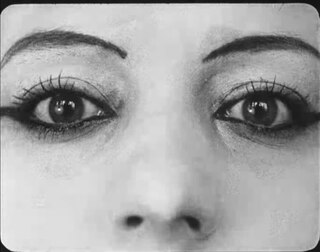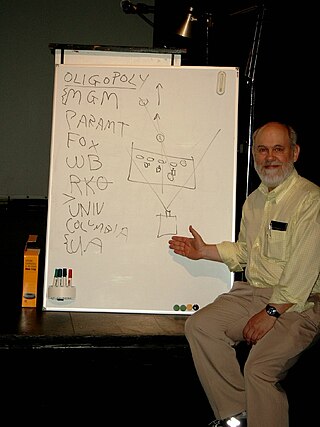Film theory is a set of scholarly approaches within the academic discipline of film or cinema studies that began in the 1920s by questioning the formal essential attributes of motion pictures; and that now provides conceptual frameworks for understanding film's relationship to reality, the other arts, individual viewers, and society at large. Film theory is not to be confused with general film criticism, or film history, though these three disciplines interrelate.

Media studies is a discipline and field of study that deals with the content, history, and effects of various media; in particular, the mass media. Media Studies may draw on traditions from both the social sciences and the humanities, but mostly from its core disciplines of mass communication, communication, communication sciences, and communication studies.
Social science is one of the branches of science, devoted to the study of societies and the relationships among individuals within those societies. The term was formerly used to refer to the field of sociology, the original "science of society", established in the 18th century. In addition to sociology, it now encompasses a wide array of academic disciplines, including anthropology, archaeology, economics, human geography, linguistics, management science, communication science, psychology and political science.

Communication studies or communication science is an academic discipline that deals with processes of human communication and behavior, patterns of communication in interpersonal relationships, social interactions and communication in different cultures. Communication is commonly defined as giving, receiving or exchanging ideas, information, signals or messages through appropriate media, enabling individuals or groups to persuade, to seek information, to give information or to express emotions effectively. Communication studies is a social science that uses various methods of empirical investigation and critical analysis to develop a body of knowledge that encompasses a range of topics, from face-to-face conversation at a level of individual agency and interaction to social and cultural communication systems at a macro level.
The University of Southern California School of Cinematic Arts (SCA) houses seven academic divisions: Film & Television Production; Cinema & Media Studies; John C. Hench Division of Animation + Digital Arts; John Wells Division of Writing for Screen & Television; Interactive Media & Games; Media Arts + Practice; Peter Stark Producing Program.

Experimental film or avant-garde cinema is a mode of filmmaking that rigorously re-evaluates cinematic conventions and explores non-narrative forms or alternatives to traditional narratives or methods of working. Many experimental films, particularly early ones, relate to arts in other disciplines: painting, dance, literature and poetry, or arise from research and development of new technical resources.
A film school is an educational institution dedicated to teaching aspects of filmmaking, including such subjects as film production, film theory, digital media production, and screenwriting. Film history courses and hands-on technical training are usually incorporated into most film school curricula. Technical training may include instruction in the use and operation of cameras, lighting equipment, film or video editing equipment and software, and other relevant equipment. Film schools may also include courses and training in such subjects as television production, broadcasting, audio engineering, and animation.
Television studies is an academic discipline that deals with critical approaches to television. Usually, it is distinguished from mass communication research, which tends to approach the topic from a social sciences perspective. Defining the field is problematic; some institutions and syllabuses do not distinguish it from media studies or classify it as a subfield of popular culture studies.

David Jay Bordwell was an American film theorist and film historian. After receiving his PhD from the University of Iowa in 1973, he wrote more than fifteen volumes on the subject of cinema including Narration in the Fiction Film (1985), Ozu and the Poetics of Cinema (1988), Making Meaning (1989), and On the History of Film Style (1997).

From 1993 to 2012, The London Consortium was a graduate school in the UK offering multidisciplinary Masters and Doctoral programs in the humanities and cultural studies at the University of London. It was administered by Birkbeck, University of London, one of the constituent colleges of the University of London, and fell under the Humanities list of courses at Birkbeck.
Technoculture is a neologism that is not in standard dictionaries but that has some popularity in academia, popularized by editors Constance Penley and Andrew Ross in a book of essays bearing that title. It refers to the interactions between, and politics of, technology and culture.
Vivian Carol Sobchack is an American cinema and media theorist and cultural critic.

Tracy Fullerton is an American game designer, educator and writer, best known for Walden, a game (2017). She is a Professor in the USC Interactive Media & Games Division of the USC School of Cinematic Arts and Director of the Game Innovation Lab at USC.
Robert Stam is an American film theorist working on film semiotics. He is a professor at New York University, where he teaches about the French New Wave filmmakers. Stam has published widely on French literature, comparative literature, and on film topics such as film history and film theory. Together with Ella Shohat, he co-authored Unthinking Eurocentrism: Multiculturalism and the Media.
Created in 2013, Media Arts and Practice (MA+P) is the seventh degree-granting division of the USC School of Cinematic Arts.
Mary Beth Fielder is an American writer, director and producer of television and feature films. She served on the faculty of the University of Southern California School of Cinematic Arts from 1994 to 2009.

The School of Cinema is an academic unit in the College of Liberal & Creative Arts at San Francisco State University, a public research university in San Francisco. It has Bachelor of Arts, a Master of Arts, and Master of Fine Arts in cinema programs. These programs have been frequently included in the annual "Top 25 American Film Schools" rankings published by The Hollywood Reporter.
The following outline is provided as an overview of and topical guide to the humanities:
Dr. hab. Piotr Zawojski is a Polish media expert. He is a tenured professor in the Department of Film and Media Studies at the University of Silesia in Katowice, Poland.

William Rothman is an American film theorist and critic. Since receiving his Ph.D. in philosophy from Harvard University in 1974, he has authored numerous books, including Hitchcock: The Murderous Gaze (1982), The “I” of the Camera: Essays in Film Criticism, History and Aesthetic (1988), and Tuitions and Intuitions: Essays at the Intersection of Film Criticism and Philosophy (2019). He was "part of a modern wave of thinkers to apply questions of philosophy to the medium of movies" during the 1980s, and his work contributed to the emergence of the sub-discipline that has come to be known as “film-philosophy.” Rothman has also written on aspects of film theory and on the writings of Stanley Cavell, an American philosopher who made film a major focus of his work. He is currently Professor of Cinematic Arts in the School of Communication at the University of Miami.








